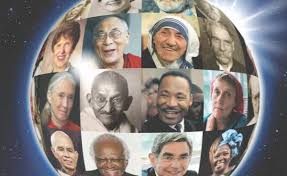How to Be a Peacemaker
 |
| Google Image |
If you regularly look at the videos in Facebook’s “Watch” category, you get the impression that the country has turned into a giant boxing ring with no rules.
Watching videos is far from the kind of data gathering needed to know the true state of the nation, or the world. But news reports of increasing violence on airplanes, at restaurants, sporting events (often fueled by alcohol consumption), in supermarkets, families, school boards, political campaigns and religious communities make you wonder how many of us have become off-kilter.
It’s true that violence is nothing new, nor is it confined to the U.S. But it does appear to be a trend, one that should concern people searching for God. Despite the impression given by some Old Testament writers (such as Ezekiel, whom I’m currently reading), the Judeo-Christian God is definitively non-violent. That becomes more apparent in the New Testament.
Called Children of God
“Blessed are the peacemakers,” says Jesus in Matthew’s gospel, among the verses comprising the Beatitudes, “for they shall be called sons of God.”
The idea of being a peacemaker doesn’t get much attention today, including among the clergy. But the Beatitudes comprise, in a nutshell, what it means to be a searcher for God. And in my view, being a peacemaker is essential to the search.
So how to be a peacemaker in today’s world?
Just to clarify, this blog may for some readers be uncomfortably close to being political, and God forbid that we should suggest that our religious values have an impact on our actual lives! This blog is political only in the broad sense of the word, “the total complex of relations between people living in society.” (Merriam Webster dictionary)
In a nutshell, it’s another blog of my views on what it means to search for God in the “modern” world.
 |
| Google Image |
To quote Pope Paul VI, who died in 1978, “If you want peace, work for justice.” Being a peacemaker means to be passionate for development, to desire and work so that everyone has a shot at self-fulfillment, physically, emotionally and spiritually. And it’s true that this may require “getting your hands dirty” in politics, but not as people stuck in one party or another.
“To be a political alternative,” wrote Tish Harrison Warren, an Anglican priest, in a column in Christianity Today last year, “we, like the early church, must confuse calcified cultural categories. Those early Christians were cultural misfits: radically pro-life, sexually chaste, committed to the poor and marginalized, and devoted to racial and ethnic justice and reconciliation. We are called to the same.
Ignoring Scripture and Tradition
“These convictions don’t place us neatly in one political party. But our current emaciated political theology has formed us into (people) who ignore or denigrate parts of Scripture and tradition that don’t fit into our prior partisan commitments.
“We need postures of humility, truthfulness, joy, kindness, and love for our enemies—postures profoundly lacking on both sides of the aisle. The deepest divide in American politics is not between right or left but between those who are committed to these postures in word and deed and those who are not.”
In short, people searching for God become peacemakers by being more God-like.



Comments
Post a Comment